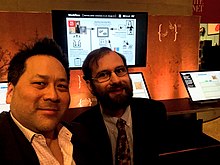2019:GLAM/Workflows for uploading GLAM collections to Wikidata and Commons
This is a Closed submission for Wikimania 2019. It has been reviewed and was not accepted. |
Title
[edit | edit source]Workflows for uploading GLAM collections to Wikidata and Commons
Description
[edit | edit source]
An increasing number of GLAM organizations are releasing their collections through open access initiatives. There is a need to help support the dual task of mapping their open collections data to Wikidata, while also contributing and linking an object's associated multimedia to Wikimedia Commons.
This session will discuss the issues around the simultaneous donation of multimedia content to Commons and structured data to Wikidata. We will present practical tools and strategies around this task through the experiences of the presenters at The Metropolitan Museum of Art and Museu Paulista of the University of São Paulo.
Some critical issues include:
- Assisting cultural institutions to embrace open access licenses and practices
- Creating a strategy for contributing a museum/archive's unique holdings to Wikidata
- Mapping existing GLAM organization classification and depiction keywords to Wikidata items
- Adapting quantitative metadata to Wikidata, such as dates, dimensions and coordinates
- Fixing large-scale ontology problems on Wikidata
- Uploading large image sets efficiently and in a Wikimedia community-friendly way
- Working with GLAM institutions on determining the impact of their contributions
While this session is data-focused and will discuss techniques and APIs for interacting with the Wikidata and Commons, it is meant to be approachable by ordinary users and non-programmers. Tools to be covered include GLAM Wiki Toolset (GWT), Pattypan, Mix-n-Match, OpenRefine, GLAMpipe, Wikidata Distributed Game, TABernacle, spreadsheet utilities, PAWS (Python notebook), and various Python code tools for working with MediaWiki and Wikibase.
This is meant to be a participatory and interactive session, so a portion of the time will be dedicated to hearing from attendees about their experiences and needs. We welcome other collaborators to get in touch with their case studies and examples.

Links:
- The Met Museum introduced an open access policy in February 2017 with the assistance of the Wikimedia Foundation. (https://www.metmuseum.org/blogs/digital-underground/2017/open-access-at-the-met)
- NeuroMat offers photos of São Paulo taken by Werner Haberkorn - By Giovanna Fontenelle (https://difusaoneuromat.wordpress.com/2018/05/18/neuromat-disponibiliza-fotografias-de-sao-paulo-tiradas-por-werner-haberkorn/)
About the speakers:
- Giovanna Fontenelle - From 2018-2019, Giovanna was the Wikipedian in residence at Museu do Ipiranga, supported by NeuroMat in Sao Paulo, Brazil.
- Andrew Lih - Starting with a research project in 2018, Andrew has been the Wikimedia strategist at The Metropolitan Museum of Art in New York. He is the author of the Wikipedia Revolution (2009) and does Wikidata training with GLAM institutions.
- Effie Kapsalis - Senior Digital Program Officer, Smithsonian Institution.
- Kelly Doyle - Open Knowledge Coordinator, Smithsonian Institution. From 2015-2018, Kelly was the Wikipedian in Residence for Gender Equity at West Virginia University Libraries.
Relationship to the theme
[edit | edit source]This session will address the conference theme — Wikimedia, Free Knowledge and the Sustainable Development Goals — in the following manner:
Partnerships (SDG 9, 17) with GLAM institutions around the world are the best way to reduce inequality and access to knowledge (SDG 4, 5, 10) that currently exist not only in the world, but within our own movement.
Session outcomes
[edit | edit source]At the end of the session, the following will have been achieved:
Attendees will:
- Understand the benefits and challenges of working with GLAM institutions for Wikimedia content donations/collaborations.
- Develop a working knowledge of tools and workflows used for GLAM donations
- Learn best practices and methods through tutorials/case studies
- Share ideas and experiences around GLAM collaboration
- Connect with experienced and new Wikimedians working with GLAM institutions on these type of projects.
Session leader(s)
[edit | edit source]Usernames
[edit | edit source]- Giovanna Fontenelle
- Andrew Lih
Affiliation/country
[edit | edit source]- Brazil, Wiki Movimento Brasil
- United States, Wikimedia DC
E-mail contact
[edit | edit source]- giofontenelle@gmail.com
- andrew.lih@gmail.com
Session type
[edit | edit source]Each Space at Wikimania 2019 will have specific format requests. The program design prioritises submissions which are future-oriented and directly engage the audience. The format of this submission is a:
- Computer-based training
- Discussion-based training
Length of session (if other than 20 minutes, specify how long)
[edit | edit source]40 minutes for presentation and demonstration
Supporting work (optional)
[edit | edit source](Feel free to provide links to existing work related to your session- wiki pages, web sites, blog posts, presentations, Youtube videos, social media. This may help the program committee determine session selections.)
- Wikidata Lab XII - https://pt.wikipedia.org/wiki/Wikip%C3%A9dia:Edit-a-thon/Atividades_em_portugu%C3%AAs/Wikidata_Lab_XII
- Blog post - https://www.metmuseum.org/blogs/now-at-the-met/2018/open-access-anniversary-event
Requirements
[edit | edit source]The session will work best with these conditions:
- Room: Any type of room with projector
- Audience: 30-50, those working with GLAM institutions or doing data/image uploads
- Recording: Yes, recording allowed

